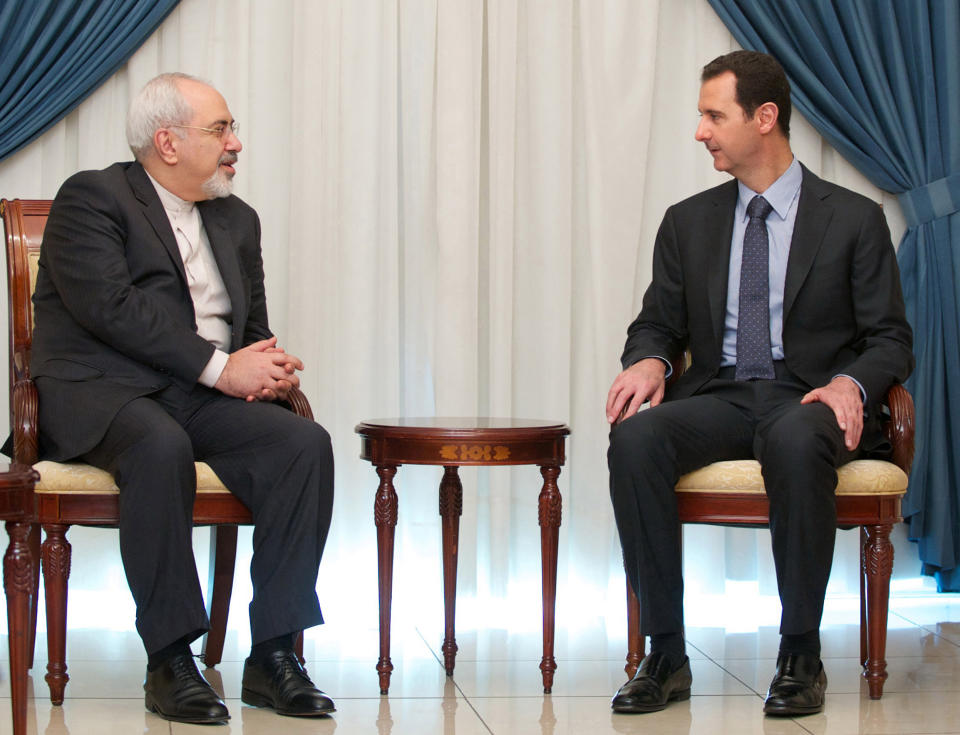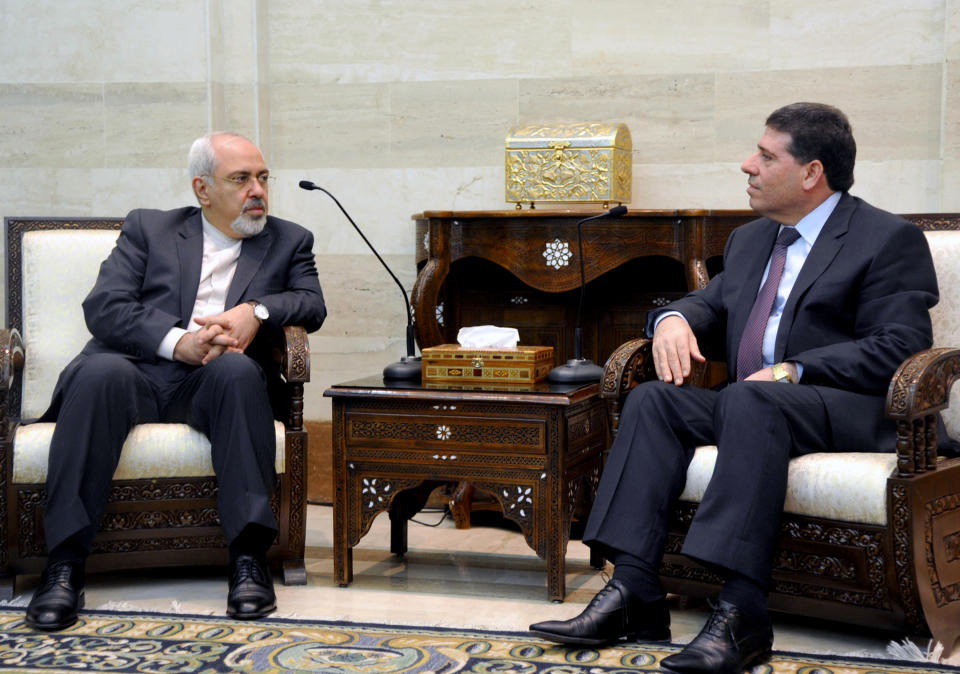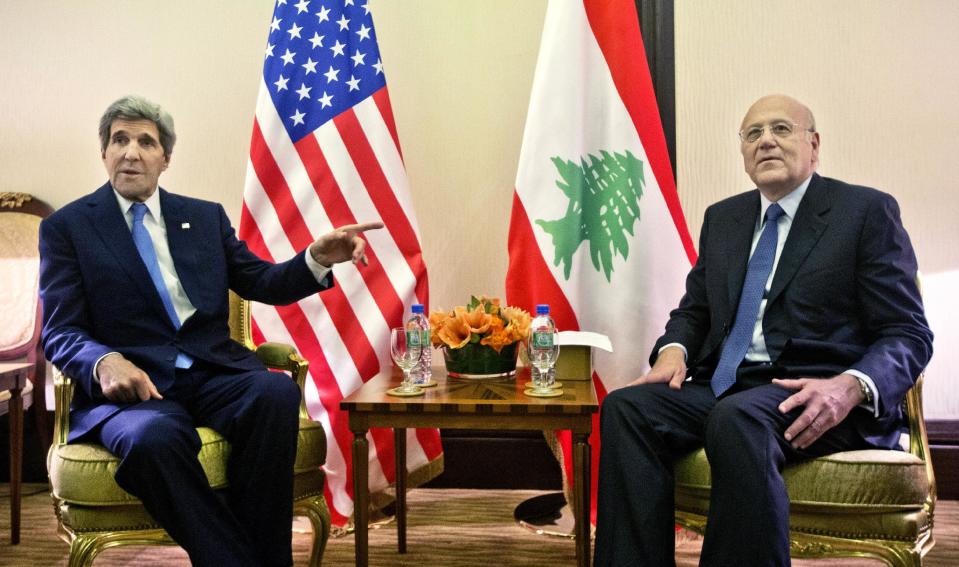UN chief urges Syrian opposition to join talks
KUWAIT CITY (AP) — The U.N. secretary-general on Wednesday urged Syria's Western-backed but fragmented opposition to attend upcoming peace talks, as President Bashar Assad met with regional ally Iran's top diplomat ahead of the negotiations next week aimed at finding a way out of the country's bloody three-year conflict.
Prospects for the peace conference — the first time Syria's two warring sides will hold direct talks — are dim as each side remains firmly entrenched in their position.
The opposition insists the talks should lead to a transitional government that would see President Bashar Assad hand over power. The government, which relies heavily on Tehran's material and political support, says that is out of the question. It has indicated Assad may run for re-election in June.
The fundamental question of whether to talk to Assad has weighed heavily on the country's main Western-backed opposition group, the Syrian National Coalition. It is supposed to lead the anti-Assad groups in the talks, but it is teetering on the brink of collapse, dragged down by outside pressures, infighting and deep disagreements.
The group is under immense pressure by the international community to take part in the so-called Geneva conference, which is set to open Jan. 22 in Montreux, Switzerland.
That pressure was reflected in Secretary-General Ban Ki-moon's prodding Wednesday. Wrapping up a Syrian humanitarian aid donor conference in Kuwait, he called on the coalition to join the upcoming U.N.-backed peace talks with a "coherent and unified delegation."
"We have not yet received firm confirmation from them. We do not have much time left," he said. "We have exactly one week left."
The coalition plans to make a final decision on whether to attend the talks on Friday. Representatives could not be reached for comment Wednesday.
As it weighs its decision, Syria's government was making its own preparations for the talks.
Assad met Wednesday with Iranian Foreign Minister Mohammad Javad Zarif in Damascus to discuss the upcoming negotiations. Syria's state news agency SANA said the Iranian envoy expressed Tehran's support for Assad's government as it heads to the conference.
Iran is Assad's strongest regional ally, extending him billions of dollars in credit since the crisis began in March 2011. The United States, Saudi Arabia and other countries in the Persian Gulf suspect Tehran is also shipping him weapons.
Iran has not yet been invited to the talks, although a final decision has yet to be made. The U.N. supports giving Iran a role, but the United States has been blocking its participation because it believes an Iranian presence at the meeting would not be productive. The Syrian opposition is also opposed to Iranian participation.
Ban said Wednesday he believes "the Iranians' participation is very important" but acknowledged their presence remains a sticking point.
"Iran is a very important regional country. Even when there will be an agreement to establish a transitional governing body with full executive powers, then we will have to get support and cooperation from the Iranian government," he said.
In his meeting with the Iranian envoy, Assad warned against what he described as the dangers of Saudi Arabia's brand of purist Islam, telling SANA that "Wahabi ideology now threatens the whole world, not only regional states."
"The Syrian people and others in the region now know the dangers of this terrorist ideology and everyone should participate in confronting and eradicating it," Assad was quoted as saying.
Sunni powerhouse Saudi Arabia, archrival of Shiite Iran, is among the strongest backers of Syria's opposition fighters who are trying to end four decades of Assad family rule in Syria. Assad belongs to the minority Alawite sect, an off-shoot of Shiite Islam, while most opposition fighters are Sunnis.
The agency quoted Zarif as saying that "countries of the region should unite to confront the challenges and fight terrorism in order to achieve security and stability."
The Syrian government says it is fighting "terrorists" who came from more than 80 countries. Last year, Lebanon's Iranian-backed Hezbollah group openly started taking part in Syria's civil war, fighting along Assad's forces.
In 2012, the chief commander of Iran's powerful Revolutionary Guard, Gen. Mohammad Ali Jafari, said the unit had high-level advisers in Syria but denied it has fighters there. More recently, however, analysts say that Iranian troops and commanders have taken on a more direct role in the conflict.
Also Wednesday, a small opposition coalition of a dozen groups with roots in Syria said it will not take part in next week's peace talks, basing its decision on the fact that the coalition has yet to decide whether to go. All opposition groups have been put under pressure to take decisions within four days before the talks, it added.
"This method to hold a conference in order to decide the fate of people and a nation cannot be described as serious," the National Coordination Body for Democratic Change in Syria said a statement. The group has been tolerated by Syria's government, although several of its senior figures are in jail.
Fighting between the al-Qaida-linked Islamic State of Iraq and the Levant and other Islamic groups in northern and eastern Syria has killed hundreds of people over the past two weeks.
Syria's state TV said government forces killed "dozens of terrorists" in different areas including Idlib, the southern province of Daraa and the eastern region of Deir el-Zour that borders Iraq. Syria's state media refers to rebels as terrorists.
Also Wednesday, activists reported that a car bomb killed at least 10 people and wounded dozens in a northern Syrian town near the Turkish border.
_____
Associated Press writers Albert Aji in Damascus, and Zeina Karam and Bassem Mroue in Beirut contributed reporting.
Follow Adam Schreck on Twitter at —www.twitter.com/adamschreck



